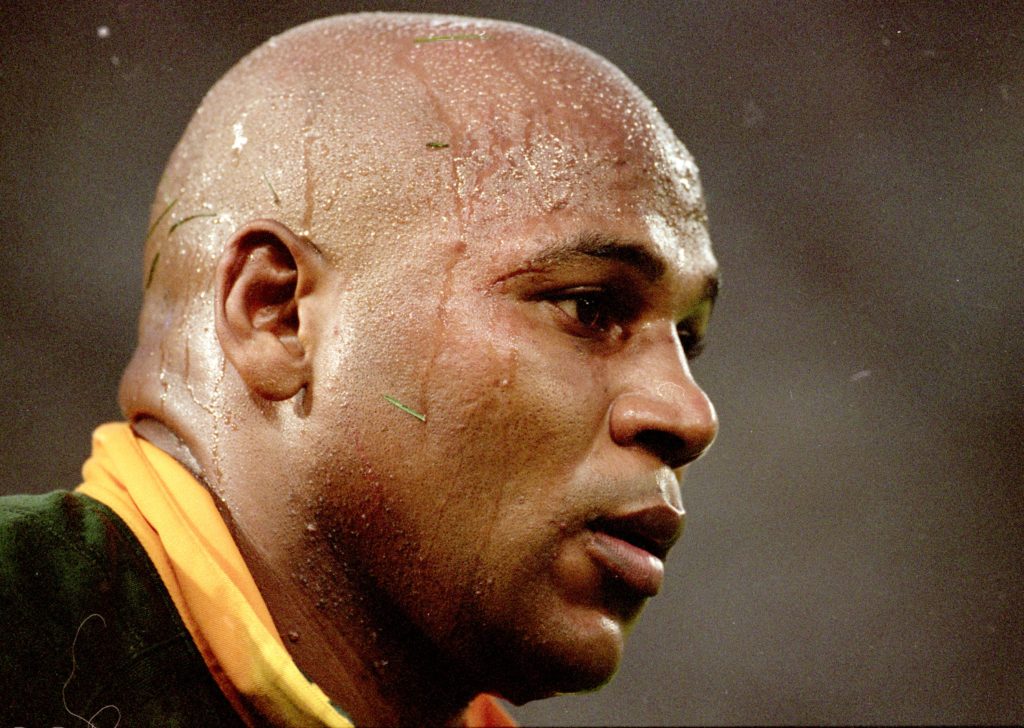Springbok wing Chester Williams will be remembered as a South African hero on and off the pitch, writes JON CARDINELLI.
It’s been less than two months since James Small passed away. On Friday evening, it was confirmed that an even bigger icon had gone to join Small, Joost van der Westhuizen, Ruben Kruger and Nelson Mandela on that great big rugby field in the sky.
It’s been a terrible month for the country. News of Williams’ passing would have come as yet another blow to a punch-drunk South African public.
Gone too soon. How much more could the 49-year-old player turned coach have achieved? How much more could Williams have given to a sport and a country that he held so close to his heart?
SA RUGBY: ‘Chester a true pioneer’
The answers to these questions will do little to ease the pain. Williams, in his capacity as the University of Western Cape head coach, had plenty more to give.
His legacy is worth celebrating, though. A lot of people will be hurting right now, but there’s something to be said for the fact that what Williams achieved during a relatively short career with the Boks will echo into eternity.
Chester Williams was the face of the 1995 World Cup. He was a symbol of hope for black South Africans at a time when the country was undergoing significant changes. He was an inspiration to kids of all colour growing up in South Africa during the 1990s.
I remember meeting Williams a decade after the Boks won the 1995 World Cup. What struck me was his humility. He was a superstar, but was generous with his time.
When I got the chance to interview him for SA Rugby magazine a few years later, Williams was open and honest about his role in bridging the racial divide. The word regret, evidently, wasn’t in his vocabulary.
‘Looking back, I don’t think there’s much more I could have done,’ he said.
‘I was part of the team that won the 1995 World Cup and the side that won the 1998 Tri-Nations. We equalled the world-record run of 17 consecutive Test wins while I was still with the Boks. As a player, you can’t really ask for more than that.’
VIDEO TRIBUTE: The legend of Chester
Williams’s international career began in 1993. The Boks beat Argentina 52-23 in Buenos Aires, with Williams scoring a try on debut to further mark the occasion.
When I asked Williams to speak about that game, his whole face lit up.
‘I remember the night before my first Test so clearly,’ he said. ‘Jacques Olivier was ill, but not injured, so I didn’t expect to play.
‘The management came to my room and told me that I would be starting. I ran down the passage to find journalist Dan Retief so that I could use his phone to call my parents. I was so excited to be playing for the Springboks.’
This enthusiasm was evident in all 27 of Williams’s appearances for South Africa. In a seven-year tenure between 1993 and 2000, he crossed the tryline 14 times.
Pieter Hendriks enjoyed a fantastic start to the 1995 World Cup when he scored the opening try of the tournament. His participation in that competition ended, though, after he was sent off against Canada at Boet Erasmus Stadium in Port Elizabeth.
Williams went on to regain the No 11 jersey, and ultimately claim a World Cup-winners medal. Beating the All Black 15-12 in the final at Ellis Park was, unsurprisingly, a career highlight.
‘We were so relieved to win after 100 minutes of extremely intense rugby,’ he said. ‘Both teams were very strong and had some incredibly talented players.’
TWITTER: Tributes pour in for Chester
His passion for rugby developed long before he reached the top.
‘When I finished school at the age of 18, I wasn’t sure what I wanted to do with my life, so I joined the navy. I played a lot of rugby while I was enlisted. My skills and love for the game grew. It was also a means of making some good money.’
That was in 1988 during the dark days of apartheid. Five years later, Williams became the first player of colour to represent his country after unification.
What makes a player a legend? Is it the personal awards or milestones he collects over the course of his career? Is it the way he plays, a certain quality he possesses that sets him far and above the competition?
Blessed with an abundance of talent, is it the use of his gift for something more significant than his own agenda that wins him legendary acclaim?
Rugby fans around the world will remember numerous players for many of these reasons, but only a handful for all of them.
When I asked Williams about his role as trailblazer, he didn’t hesitate to answer. It’s an answer that seems especially important now, in the wake of his death.
‘I’d love to be remembered as a great player and as someone who paved the way for non-white players to be selected on merit,’ he said.
Rest assured, Chester. You will be.
RIP.
Photo: Dave Rogers /Getty Images





